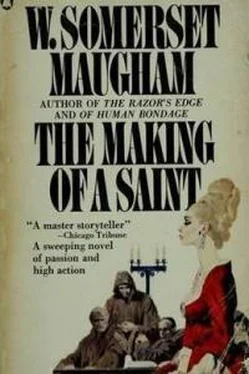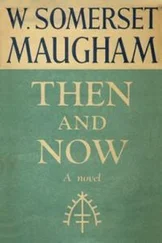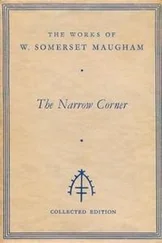We stood looking up at her with open mouths, dumbfounded. A cry of rage broke from the people; Matteo uttered an oath. Checco looked angrily at Savello, but said nothing. The priest was furious; his big red face grew purple, and his eyes glistened like a serpent's.
'Bastard!' he hissed. 'Bastard!'
Trembling with anger, he ordered the children to be sent for, and he cried out to the Countess,—
'Do not think that we shall hesitate. Your sons shall be hanged before your very eyes.'
'I have the means of making more,' she replied scornfully.
She was lion–hearted. I could not help feeling admiration for the extraordinary woman. Surely she could not sacrifice her children! And I wondered if a man would have had the courage to give that bold answer to Savello's threats.
Savello's expression had become fiendish. He turned to his assistants.
'Let a double scaffold be erected here, at once and quickly.'
The chiefs of the conspiracy retired to a sheltered place, while the mob gathered in the piazza; and soon the buzz of many voices mingled with hammering and the cries of workmen. The Countess stood above looking at the people, watching the gradual erection of the scaffold.
In a little while its completion was announced. Savello and the others came forward, and the priest once more asked her whether she would surrender. She did not deign to answer. The two boys were brought forward—one was nine, the other seven. As the people looked upon their youth a murmur of pity passed through them. My own heart began to beat a little. They looked at the scaffold and could not understand; but Cesare, the younger, seeing the strange folk round him and the angry faces, began to cry. Ottaviano was feeling rather tearful too; but his superior age made him ashamed, and he was making mighty efforts to restrain himself. All at once Cesare caught sight of his mother, and he called to her. Ottaviano joined him, and they both cried out,—
'Mother! Mother!'
She looked at them, but made not the slightest motion, she might have been of stone…. Oh, it was horrible; she was too hard!
'Once more, I ask you,' said Savello, 'will you surrender the castle?'
'No—no!'
Her voice was quite steady, ringing clear as a silver bell.
Savello made a sign, and two men approached the boys. Then suddenly they seemed to understand; with a shriek they ran to Checco, and, falling at his feet, clasped his knees. Ottaviano could hold out no longer; he burst into tears, and his brother, at the elder's weakness, redoubled his own cries.
'Oh, Checco, don't let them touch us!'
Checco took no notice of them; he looked straight in front of him. And even when the Count had just fallen under his dagger he had not been so ghastly pale…. The children were sobbing desperately at his knees. The men hesitated; but there was no pity in the man of God; he repeated his sign more decisively than before, and the men advanced. The children clung to Checco's legs, crying,—
'Checco, don't let them touch us!'
He made no sign. He held his eyes straight in front of him, as if he saw nothing, heard nothing. But his face! Never have I seen such agony….
The children were torn from him, their hands bound behind their backs. How could they! My heart was bursting within me, but I dared say nothing. They were led to the scaffold. A sobbing cry came from the people and wailed through the heavy air.
The Countess stood still, looking at her children. She made not the slightest motion; she might have been of stone.
The children cried out,—
'Checco! Checco!'
It was heartbreaking.
'Go on!' said Savello.
A groan burst from Checco, and he swayed to and fro, as if he were going to fall.
'Go on!' said Savello.
But Checco could not bear it.
'Oh, God! Stop!—stop!'
'What do you mean?' said Savello, angrily. 'Go on!'
'I cannot! Untie them!'
'You fool! I threatened to hang them, and I will. Go on!'
'You shall not! Untie them, I tell you!'
'I am master here. Go on!'
Checco strode towards him with clenched fists.
'By God, Master Priest, you shall go the way you came, if you thwart me. Untie them!'
In a moment Matteo and I had pushed aside the men who held them, and cut their cords. Checco staggered towards the children, and they with a bound threw themselves into his arms. He clasped them to him passionately, and covered them with kisses. A shout of joy broke from the people, and many burst into tears.
Suddenly we saw a commotion on the castle walls. The Countess had fallen back, and men were pressing round her.
She had fainted.
We went home rather troubled. Savello was walking alone, very angry, with a heavy frown between his eyes, refusing to speak…. Checco was silent and angry too, half blaming himself for what he had done, half glad, and Bartolomeo Moratini was by his side, talking to him. Matteo and I were behind with the children. Bartolomeo fell back and joined us.
'I have been trying to persuade Checco to apologise to Savello, but he will not.'
'Neither would I,' said Matteo.
'If they quarrel, it will be the worse for the town.'
'If I were Checco, I would say that the town might go to the devil, but I would not apologise to that damned priest.'
When we reached the Palazzo Orsi a servant came out to meet us, and told Checco that a messenger was waiting with important news. Checco turned to Savello, and said gloomily,—
'Will you come? It may need some consultation.'
The protonotary did not answer, but walked sulkily into the house. After a few minutes, Checco came to us, and said,—
'The Duke of Milan is marching against Forli with five thousand men.'
No one spoke, but the expression on the protonotary's face grew darker.
'It is fortunate we have preserved the children,' said Bartolomeo. 'They will be more useful to us alive than dead.'
Savello looked at him; and then, as if trying to mend the breach, but rather against his will, said ungraciously,—
'Perhaps you were right, Checco, in what you did. I did not see at the moment the political wisdom of your act.'
He could not help the sneer. Checco flushed a little, but on a look from Bartolomeo answered,—
'I am sorry if I was too quick of tongue. The excitement of the moment and my temper made me scarcely responsible.'
Checco looked as if it were a very bitter pill he had been forced to swallow; but the words had a reasonable effect, and the clouds began to clear away. An earnest discussion was commenced on the future movements. The first thing was to send for help against the Duke Lodovico. Savello said he would apply to Rome. Checco counted on Lorenzo de' Medici, and messengers were forthwith despatched to both. Then it was decided to gather as much victuals as possible into the town, and fortify the walls, so that they might be prepared for a siege. As to the citadel, we knew it was impossible to take it by storm; but it would not be difficult to starve it into surrender, for on the news of the Count's death the gates had been shut with such precipitation that the garrison could not have food for more than two or three days.
Then Checco sent away his wife and children; he tried to persuade his father to go too, but the Orso said he was too old and would rather die in his own town and palace than rush about the country in search of safety. In the troubled days of his youth he had been exiled many times, and now his only desire was to remain at home in his beloved Forli.
The news of Lodovico's advance threw consternation into the town, and when cartloads of provisions were brought in, and the fortifications worked at day and night, the brave citizens began to quake and tremble. They were going to have a siege and would have to fight, and it was possible that if they did not sufficiently hide themselves behind the walls, they might be killed. As I walked through the streets, I noticed that the whole populace was distinctly paler…. It was as if a cold wind had blown between their shoulders, and bleached and pinched their faces. I smiled, and said to them, in myself,—
Читать дальше











